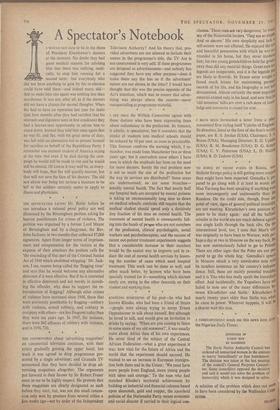in. Birds of prey pounce on monkeys gambolling in jungle
canopies; land splits, mountains fold and eccentric early animals have their usual sad look of guessing they won't last long.
Reading Aloud
The Secret Garden. By Frances Hodgson Burnett. (Heinemann, 13s. 6d.)
ONE of the most satisfying children's books ever written shows up the weakness of contemporary writers in their avoidance of wickedness, tragedy and death. A mother dying because she stayed behind 'for a silly dinner party'; a child and a snake the only creatures left alive in• a cholera- stricken bungalow—this prelude may not be what we chiefly remember about The Secret Garden, but without it the rest would be far less deeply moving. The cross-grained little girl exiled in a great Yorkshire house finds an even more miser- able sick boy there and in curing him cures herself. They discover a garden, hidden and over- grown since his mother's death, and, with the help of Dickon who is as healthy and happy as they are thrawn, they clear it, 'make it come alive' and live a secret life there while they grow well The boy, in recovering a good memory of his mother, regains his father's love.
Collected Stories for Children. By Walter de la Mare. (Faber, 21s.) Hans Brinker, or The Silver Skates: By Mary Mapes Dodge. (Collins, 7s. 6d.) King Arthur and His Knights. By Roger Lancelyn Green. (Faber, 15s.) Eight classic reprints














































 Previous page
Previous page